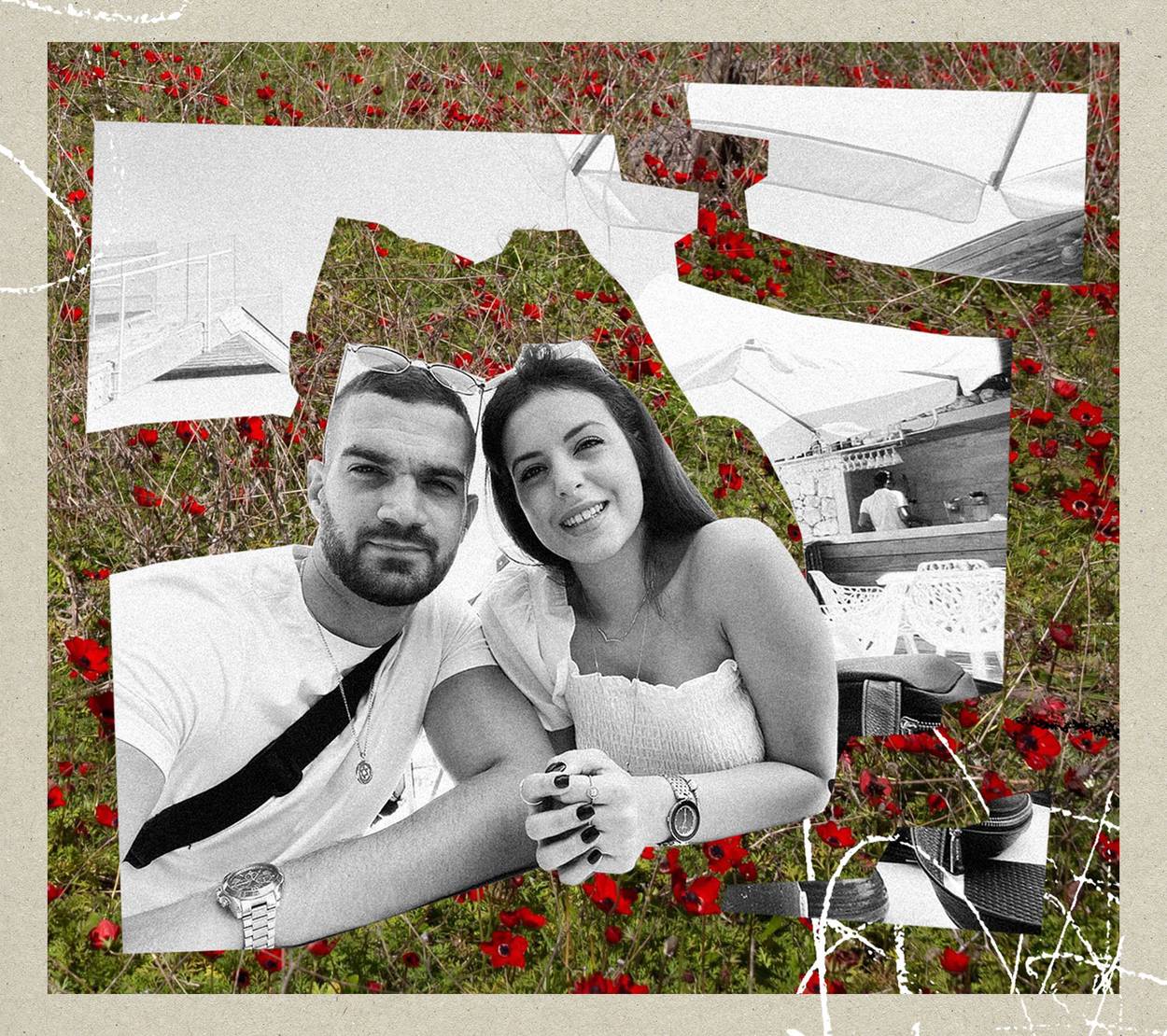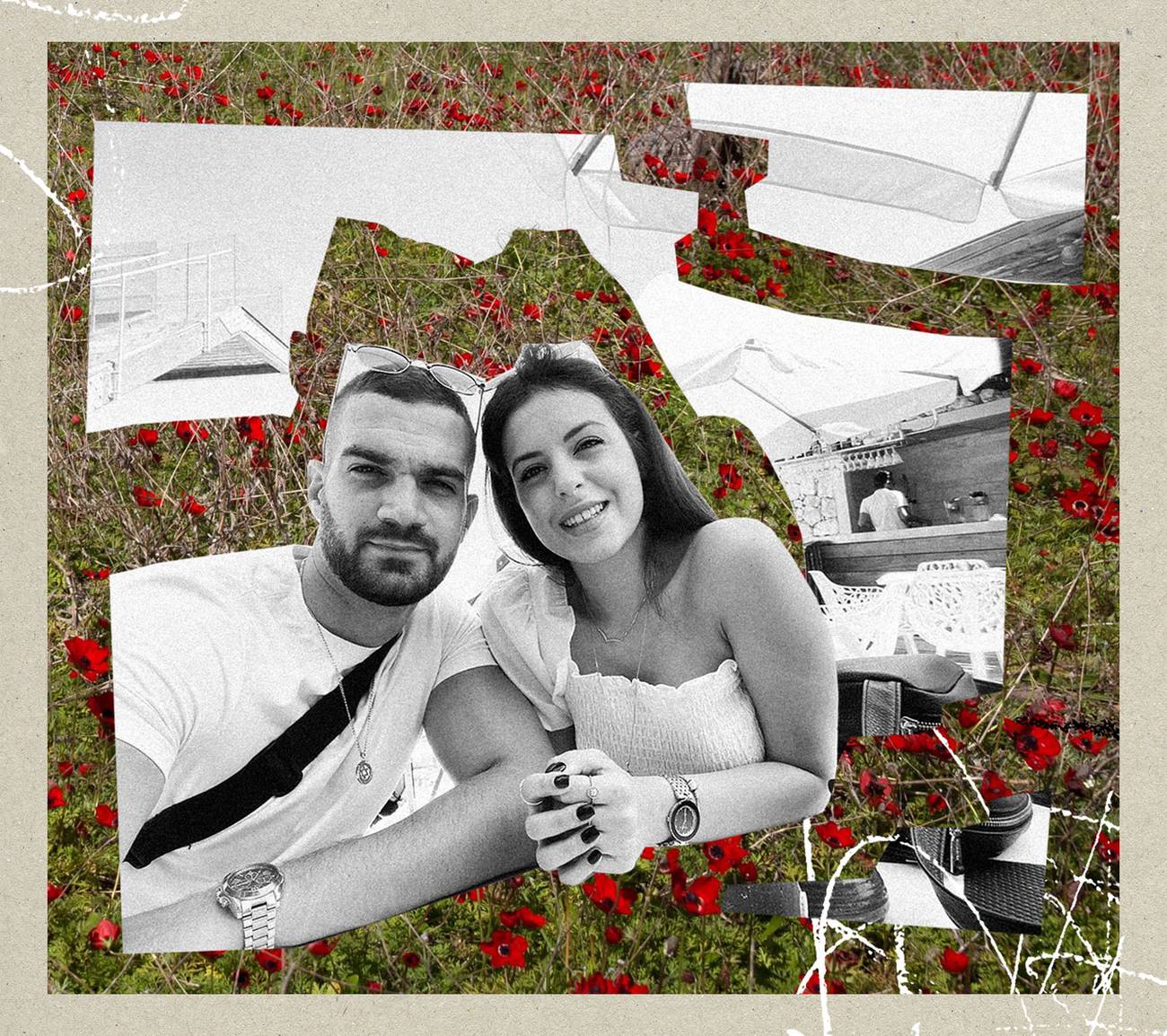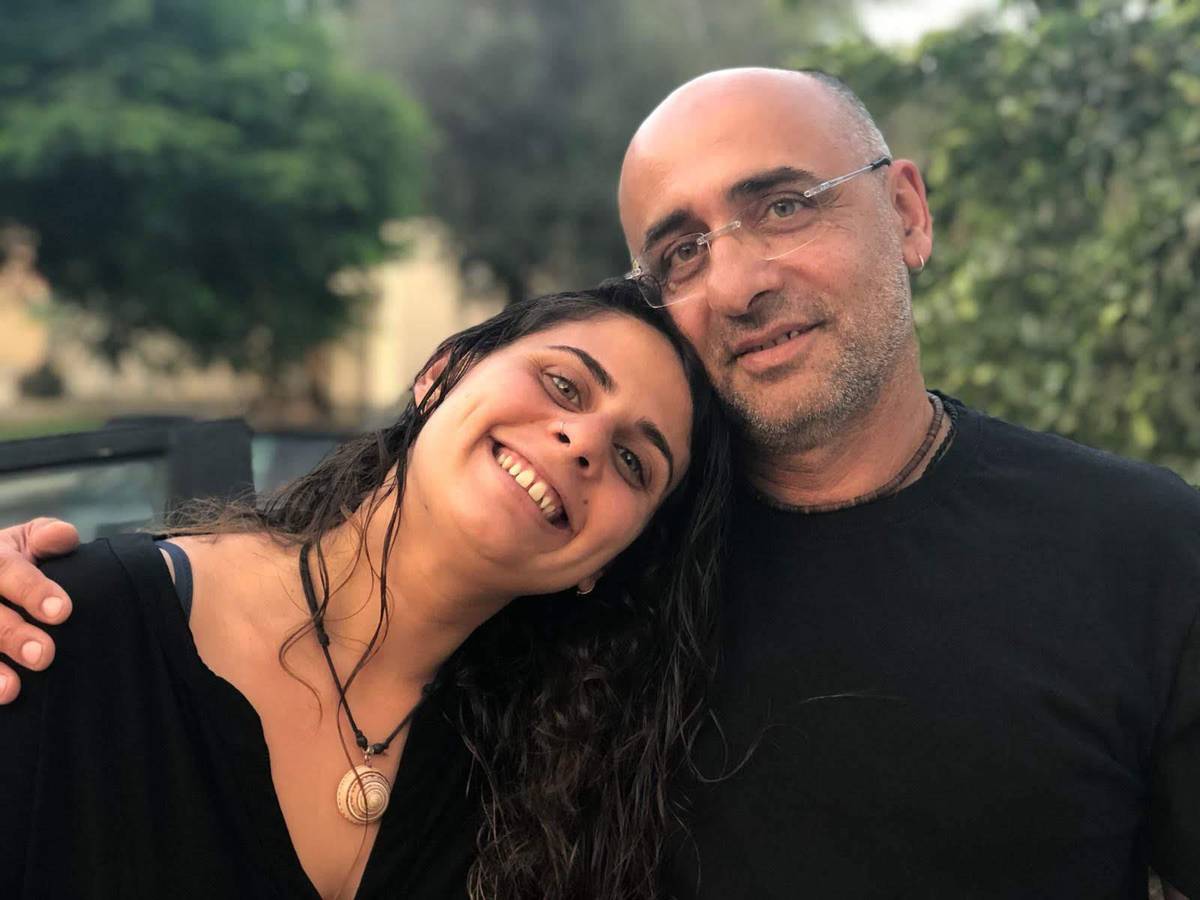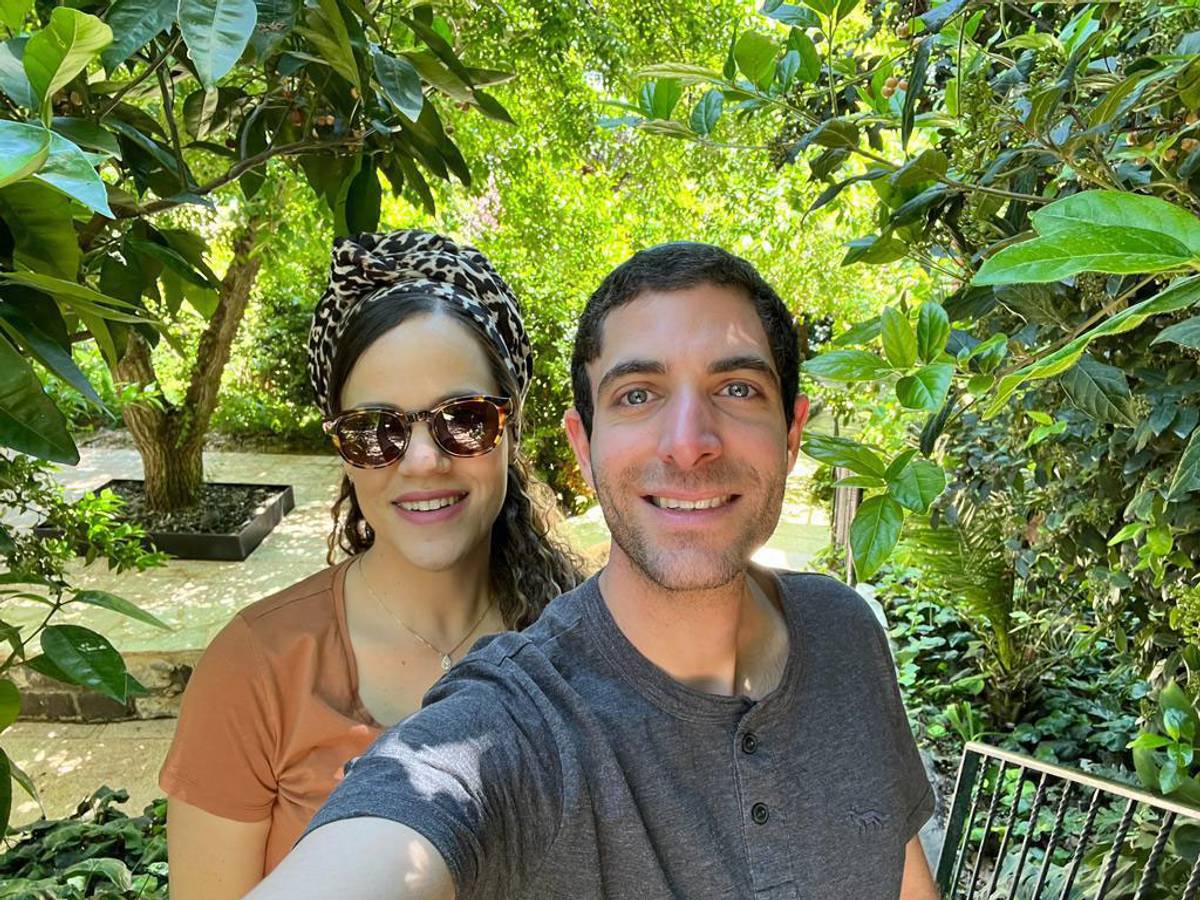Eliran and Eden Abergel drove to Tiberias the morning of Oct. 6 to celebrate the Simchat Torah holiday in Eden’s hometown with her parents. It was their second anniversary. As they did on their birthdays and the anniversary of their first date in 2015, the couple toasted each other that night. Each spoke of their happiness together, their love, their hopes for a better year ahead.
In hindsight, Eden said, Eliran’s tribute constituted his “parting words.”
The next morning, Eliran sped by motorcycle to meet his unit of the police department’s special forces responding to Hamas terrorists’ invasion of the western Negev from the Gaza Strip. He was killed defending Kibbutz Be’eri. He was 29.
Today, March 25, is Eden’s 28th birthday. Eliran won’t be there to toast her.
Eden buried Eliran on Oct. 10, the day the couple planned to fly to Barcelona for an anniversary vacation.
The day shiva ended, Eden learned that she was pregnant with their first child.
Noam’s Father Is in the Sky is the title of a children’s book that lay on the Abergels’ dining room table in Hadera when I visited on March 14. The cover drawing depicts a boy reaching for a bright star on a dark night. The woman who wrote the book gave it to Eden after a ceremony dedicating a memorial to Eliran in his hometown of Netanya.
“I believe that he’s not here physically, but his soul is here, protecting us from a better place. It will be challenging, not easy, but I believe that with all the support and love from our surroundings, the boy won’t be lacking anything,” Eden told me, sitting on her sofa opposite a shelf unit she bought to display the many framed photographs and illustrations of Eliran that people gave her.
“His son will know him, know of him, who his father was, how much he wanted him and loved him. From birth, he’ll know.”
Eden Abergel is one of 28 pregnant women widowed when their husbands died defending the country on Oct. 7 and in Israel’s subsequent war in Gaza—all fighting in security services and on reserve duty for the Israel Defense Forces. In addition to the 28 widows, two other women—Michal Lobanov and Avital Dekel-Chen—delivered babies after Hamas kidnapped their husbands, civilians Alex and Sagui, respectively, into captivity in Gaza, where the men remain. (These two women did not want to be interviewed for this article.)
Liav Sivan is one of 11 widows who have since given birth. Her husband, Lior, was killed in Gaza on Dec. 19. Their first daughter was born 18 days later. Before they had children, the couple took a drive to a grove of almond trees when their car sank in mud there. Friends extracted the car and Lior took pictures. On another vehicular adventure, their car ran out of gas. While waiting for friends to arrive to help them, the Sivans sat beside the road, made coffee, and played music.
“He took it all calmly, with a laugh and in the right proportions,” said Liav, 32. They selected the name Shaked (almond) for their baby, and after Lior’s death Liav added a middle name, Or (light), a play on her husband’s name, “because out of the situation of mud, he could see the light,” she said.
After being called into reserves on Oct. 7, Lior saw Liav four times. He also called when possible, asking about their 3-year-old son, Tal. “He always projected optimism that he would return,” said Liav. “He so looked forward to the birth [of Shaked]. He was such an involved father.”
While not herself a widow or a widowed mother-to-be, Liki Aviani helps many of them cope, and does so from a position of familiarity as a bereaved woman.
Liki Aviani, a social worker working with the IDF Widows and Orphans Organization, with her father, Shachar. Shachar was killed defending Kibbutz Kfar Aza on Oct. 7.Courtesy Liki Aviani
Aviani has worked since January as a social worker with a Petah Tikva-based nonprofit group, IDF Widows and Orphans Organization. On Oct. 7, her father, Shachar, the head of security in their home community, Kibbutz Kfar Aza, was killed fighting terrorists steps from his house.
She has spoken with 100 Israeli women, including all 28 pregnant women whose husbands have been killed in battle since Oct. 7. Aviani isn’t their therapist, but she directs them to assistance and resources. “Since I’ve been through [loss], they feel comfortable with me,” she said.
Creating a group within the IDF Widows and Orphans Organization called B’tzideich (By Your Side), geared to pregnant widows, is an idea that came to Shlomi Nahumson, the organization’s CEO, when his wife gave birth to their fourth child in early November. “All I could think of was the [pregnant] widows who are not going to have their husbands by their sides,” he said.
A WhatsApp group connects the expectant mothers to each another. The organization’s psychologists host weekly therapy sessions with them in small groups. Larger gatherings also are held.
Those in similar circumstances “can understand me in a way that maybe others can’t,” said Mahol Shosh, who learned, along with her husband, Noy, that their fourth child would be a girl just a week before he was killed defending their home at Be’eri on Oct. 7. A mechanic who managed Be’eri’s garage, Noy was summoned into reserves upon Hamas’ attack and was assembling his soldiers by phone when terrorists broke into their home that afternoon and shot him through the door of the family’s safe room, causing him to bleed to death. His wife and children were unharmed.
“I have kibbutz friends who are widows but aren’t delivering. It’s a different experience. The fact I can share stories with women in a similar situation … is very meaningful,” Shosh, 36, said. “It helps very much.”
Yuval Shani, who lives in the town of Eli in Samaria, has a son and daughter, and is expecting a second daughter. Her husband, Gavriel, was entering his third year of studies in water engineering when he was killed in battle in Gaza on Jan. 30. Hanna Cohen, from the Jerusalem suburb of Tzur Hadassah, has two daughters. The second girl was born in June, and her husband, Uriel, was killed in Gaza on Dec. 19, so Cohen is a widow but not an expectant mother.
It’s rare that a journalist doesn’t have to ask an interviewee or interviewees many questions and can fully observe an interaction that writes itself. That’s what happened in an office 59 floors above Tel Aviv’s Sarona complex, where Shani, 25, and Cohen, 31, met with me on March 17, and had the following back-and-forth among themselves:
Cohen: How long have you been pregnant?
Cohen: Do your kids sleep with you now?
Shani: Yes, and my father comes by every morning. My parents live in Yakir, which is close by.
Cohen: Oh, before I met Uriel, I dated a guy from Yakir. … When [Uriel’s friend] was killed, I was scared, because death had come to their unit. I said to him, “You’ll return home, right?” The last night, he went to say goodnight to [daughter] Shir, and he said, “Bye, Shir.” I said, “Why ‘goodbye’?” I felt a sort-of farewell. I’m religious, and I very much am angry at God—and at Uriel.
Shani: Yes, but what good does it do? On Jan. 30, at 8 p.m., I put the kids to bed. There was a knock at the door. I was tired, so I was sitting on the couch. I thought it was a neighbor. I didn’t have the strength to get up. They kept knocking and then called, “Yuval.” I texted my friend to come over, because I was afraid.
Shani: I fell on the floor when they entered, until my parents came. Were you also at home?
Cohen (after explaining that her parents stayed with her whenever reserve duty pulled her husband away): My mother asked, “Who’s knocking on the door at 2 a.m.?” I said, “Either a terrorist or the IDF, and I hope it’s a terrorist.” I couldn’t cry. I felt like the earth opened up. I said, “What happened to him?”
Hanna and Uriel Cohen. Uriel was killed in Gaza on Dec. 19.Courtesy Hanna Cohen
The women went on to discuss the officers who delivered the bitter news, their late husbands, their children, having religious Zionism in common, Shani’s work as a teacher, Cohen’s work in business development at a bank, and Uriel’s job as an economist at another bank, which is how the couple met.
Shani had to leave to pick up her children. The women rose and hugged. Cohen wished Shani, “B’sha’a tovah,” a traditional hope for a pregnant woman’s healthy delivery.
Alone with Cohen in the conference room, I remarked that she and Shani seemed to bond immediately.
“The situation definitely connects you,” Cohen said. “I see her, pregnant and with two other kids, and I imagine that to deliver without her husband comes with unimaginable pain. I delivered nine months ago, and I identify with the pain.”
Cohen spoke of balancing grief with a determination to live, of needing sometimes to be alone and other times to be with people, of socializing with couples to avoid the muck of widowhood—but also of valuing conversations with other young IDF widows.
“There are moments I think I can’t continue,” she said. “But there’s so much support from the army, the country, friends. I’m really, really not alone. People send their support.”



